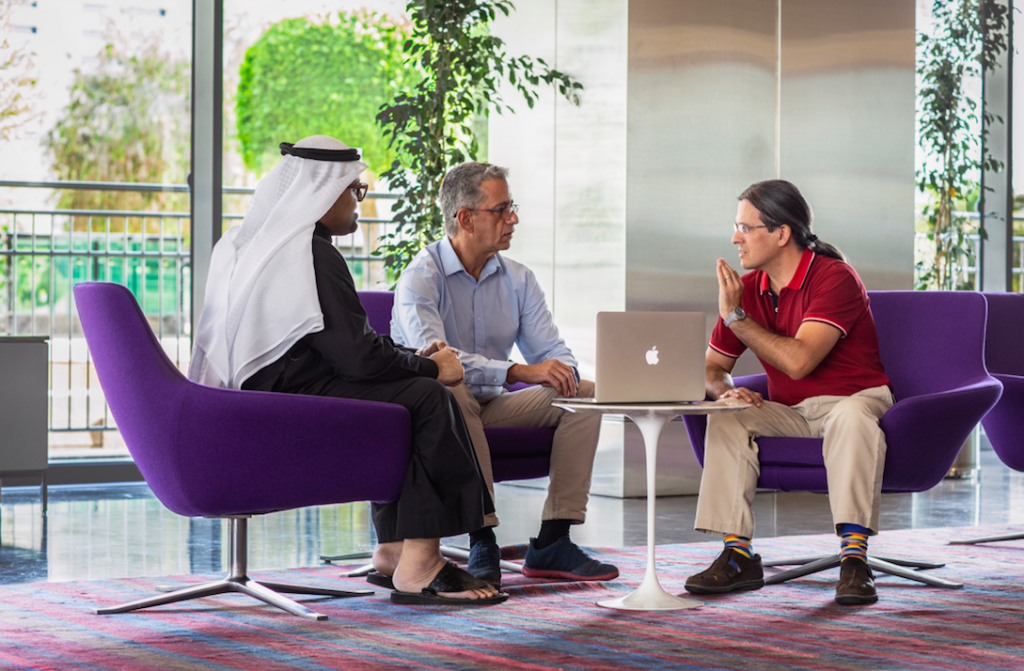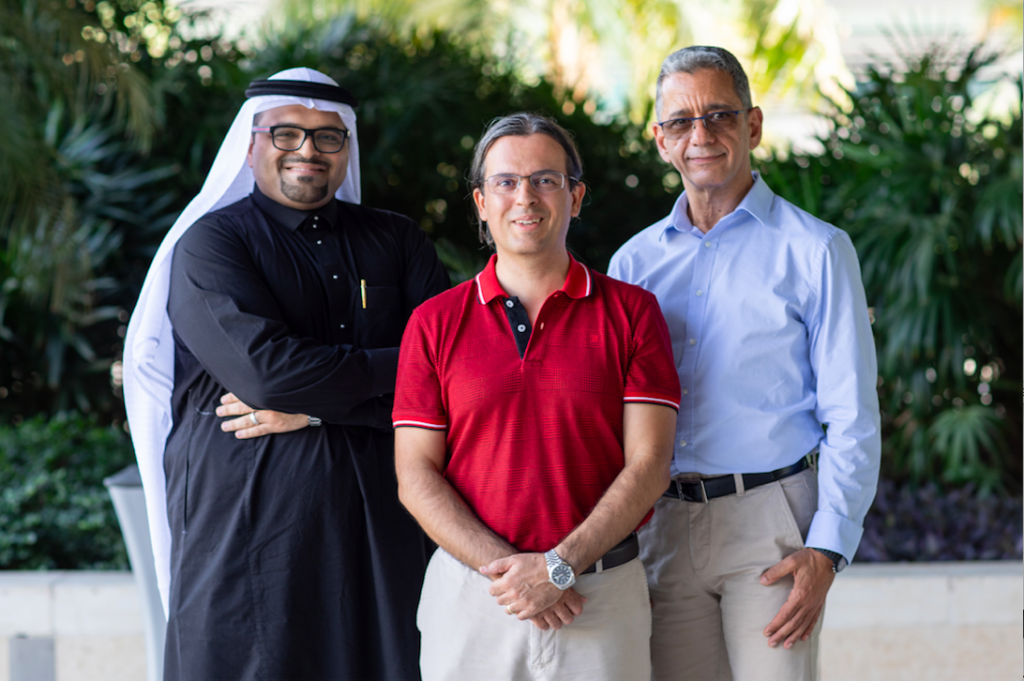Matching thousands of people to fulfill thousands of jobs is not an easy task. A high volume of requests from an ever-growing workforce poses a large challenge to most organizations. Pinpointing vacancies and facilitating transfers leads to a happier workforce that brings more efficiency to the workplace. A team of scientists from KAUST Computer, Electrical and Mathematical Science and Engineering (CEMSE) division has conceived an algorithm that can solve important issues in employee transfer systems. Building on this achievement, Professor of Applied Mathematics and Computational Science Omar Knio, Ph.D. student Sultan Al-Barakati, and Research Scientist Ricardo Lima founded Decision Science Technologies (DST) to commercialize their development.
DST is, in particular, developing a custom-built system that enhances the employee transfer experience. The startup uses decision-making algorithms to match resources and fulfill key roles by enabling individuals to step into sought after positions. The platform optimizes the staff placement throughout the Kingdom while simultaneously aiming to fill available vacancies. The system analyzes information regarding the number of applicants, performance scores, and location preferences and deploys a sensitivity scheme to refine pre-assigned vacancy and capacity values. Based on this data, the platform suggests new positions while reporting specific patterns, vulnerabilities, and inefficiencies. The outcome is an ideal match between employees and employers.

Founders of DST, a KAUST startup, Omar Knio, professor of applied mathematics and computational science; Sultan Al-Barakati, a Ph.D. student; and Ricardo Lima, a research scientist.
Improving human resources for Saudi Ministry of Health employees
In 2017, the Saudi Ministry of Health (MOH) recognized a need to improve its employee transfer system. Healthcare professionals within MOH found themselves subjected to a variety of relocation challenges. Inpatient and outpatient care centers were processing thousands of employee requests and facility demands each year and low transparency alongside a subjective approval process resulted in an unsatisfactory work transfer experience. The founders of DST worked closely with the MOH to improve the transfer process through a cloud-based employee matching service that proactively closed the gaps in the existing system by replacing objective approvals with a capacity-based approach.
“This collaborative research project addressed a challenging problem that has a big impact on healthcare professionals and ultimately the quality of services provided to the public,” said Saudi Minister of Health Dr. Tawfiq Al-Rabiah.
Job satisfaction has a lasting impact on care provided. Seen through the eyes of a transferring employee, the quality of a position alongside living conditions and proximity to one’s family determines a location’s desirability. Unfortunately, MOH human resources struggled to address the concerns of facilities and professionals. The former system was limited by capacity and lacked overall transparency for applicants, who were given preference based on a point system dictated by seniority, performance, and other factors. The process restricted applicants to a subjective approval process that limited the efficiency of the transfer system and of employee satisfaction. After reviewing these shortfalls, a need for an automated solution became clear.

Founders of DST, a KAUST startup, Omar Knio, professor of applied mathematics and computational science; Sultan Al-Barakati, a Ph.D. student; and Ricardo Lima, a research scientist.
An Algorithm to Solve Human Transfer
DST‘s matching software is unlike any other system built to match employees and organizational needs. The integrated-platform enhances HR departmental capacity by using software to refine capacity and vacancy constraints. The system offers insight and data to better understand which positions or locations are in higher demand and why. Intuitive dashboards offer valuable insight for analyzing capacity, coverage, as well as supply and demand. The system also provides for the inclusion of an incentive system that would encourage applicants to direct their applications to centers that are underserved or understaffed. Applicants see positions available and the number of competitors already in the running alongside respective qualifications. Matching algorithms are triggered to alert employers of individuals most beneficial within a context of supply and demand.
Linking the preferences of employees to the needs of specific locations is increasingly challenging at high volumes. “These types of matching problems are known to be notoriously hard and potentially difficult to solve. Our team has developed an innovative approach that addresses MOH requirements,” founder Dr. Omar Knio said. Where previously, applicants were in direct competition while each center strived to gain the highest-quality of talent. The DST team has now implemented a better way for employees to find vacancies while providing the best possible distribution of resources throughout facilities.
In July 2019, DST successfully finalized an agreement with MOH to optimize the employment and relocation process. The Ministry’s HR department expects to implement the system nationwide by early 2020.
This is only the beginning of the startup. DST continues to seek funding that will further accelerate growth and the team are exploring business development opportunities in other government agencies facing similar challenges. In the next few years, the system will become increasingly available to a range of businesses and sectors. The Ministry of Education and Ministry of Foreign Affairs, in particular, are prospective clients who could benefit from the software. Working closely with MOH, the DST team will continue to bring cutting-edge system solutions to the Kingdom and beyond.
More about entrepreneurship at KAUST
KAUST Team Finds Solution to Staff Transfers at the Saudi Ministry of Health
A Bright Future for Entrepreneurship at KAUST
Saudi Arabia’s Innovation Landscape

